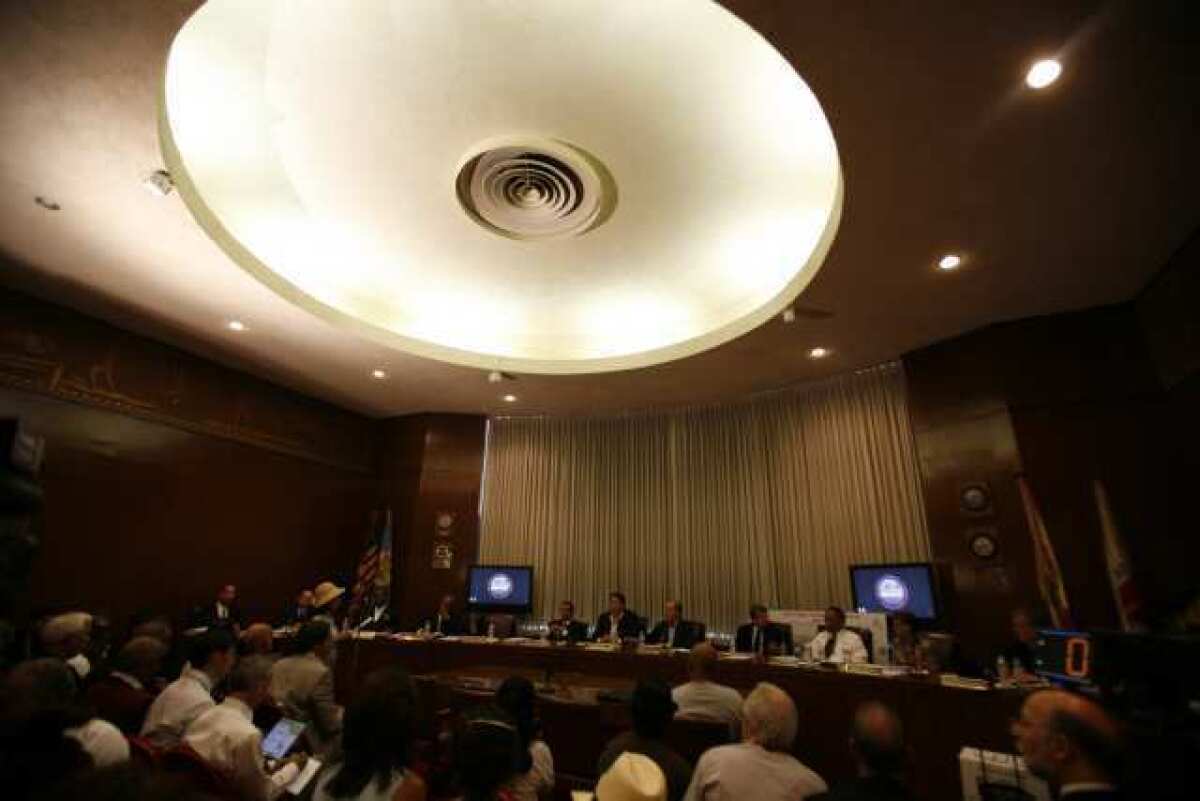Coliseum panel’s secret talks could jeopardize proposal on USC

- Share via
In a hushed, dark-walled hearing room, the Los Angeles Memorial Coliseum Commission had gathered for some momentous deliberations, finalizing a plan to turn the 88-year-old, taxpayer-owned stadium over to USC.
But first the panel members shut the doors, locking the public out.
About two hours later, after most of the audience had lost patience and left, the doors reopened. The commission issued a terse statement saying it had reached an agreement on the proposal with USC.
Behind the crescent-shaped dais, the impassive-faced commissioners took no testimony on the plan and engaged in no debate, forgoing a public give-and-take just as they had in the months spent drafting the terms for surrendering stewardship.
The meeting was not unusual. As the commission has reeled from a financial scandal, it has grown more secretive, doing nearly all of its business in private, much like a corporate board.
That’s fine when government agencies have money matters on the table, experts say, but state law requires an open airing of other points. Much of the proposed USC lease covers issues that do not involve prices or payments.
The opaque negotiations could put the Coliseum deal in legal jeopardy. “Those things … should not have been done in closed session,” said Terry Francke, an authority on the open-meeting law and an attorney for Californians Aware, a watchdog group that promotes government transparency.
Los Angeles City Councilman Bernard C. Parks, a commissioner who opposes a master lease for USC because it allows a private institution to run a public one, said the closed meetings have focused on the broad outlines of the proposal, such as granting the school naming rights to the stadium.
“There should have been public hearings,” he said. “It was a dereliction of our duty.”
The commission also has repeatedly failed to comply with the California Public Records Act, delaying the release of financial documents and other materials related to its operations.
The records law requires prompt disclosure, generally no longer than 24 days after documents are requested. Since last spring, the commission has provided a large volume of records sought by The Times, but the disclosures have slowed in recent months.
A number of documents requested last fall still have not been released, and the panel has declined to answer basic questions, such as how much money it has.
“Government officials are supposed to, if anything, err on the side of disclosure,” said Peter Scheer, executive director of the First Amendment Coalition, another organization that advocates for greater openness in government.
Parks says there’s a reason the commission has balked. Some of its members are “trying to delay releasing anything that could be negative until they get the USC deal done,” he said.
The commission is made up of appointees of the city, county and Gov. Jerry Brown’s office. By virtue of the elective positions they hold, the most influential of its nine members are county Supervisors Zev Yaroslavsky, Mark Ridley-Thomas and Don Knabe. All three declined to comment for this article, as did a Brown spokesman.
In the last year, The Times has reported on financial irregularities involving the Coliseum’s top managers. Those have included lucrative side dealings with concert promoters and stadium contractors; suitcases of cash — rather than government checks — given out to pay workers; and perks such as luxury cars, massages and golf outings.
Most of the managers have now departed. Federal, state and county investigations of their actions are underway. The commission is at the brink of insolvency, unable to pay for Coliseum upgrades it promised in its current lease with USC, whose football team plays there.
The panel’s solution is to turn over the keys; in exchange, USC will foot the bill for the renovations and assume control of day-to-day operations. But Francke said that once the new lease is approved, “anyone taking issue with the ultimate deal will have considerable legal ammunition to seek court nullification.”
He said challenges could be filed under the open-meeting law, known as the Ralph M. Brown Act.
For months, the terms of the proposal were not shared even with other public agencies that have a critical stake in the Coliseum’s future. They include the board of the neighboring California Science Center, the stadium’s landlord.
At the close of the January meeting, the commission and USC jointly placed the terms on their websites. The proposal, which is not yet legally binding, states that the two parties expect that any lease presented to the commission for adoption would contain the major provisions already hammered out.
The terms were a topic for public discussion at the commission’s regular February meeting. But about an hour after the session began, it was abruptly canceled because the agency had failed to post a notice of the meeting 72 hours in advance, as the Brown Act requires.
At a subsequent make-up meeting, the commission convened in open session for about 15 minutes, hearing some public testimony on the proposal. It spent more than two hours behind closed doors. For other government bodies, that ratio is typically reversed, experts say.
The commission’s next meeting is Wednesday.
In addition to awarding USC naming rights, the draft lease would bar the commission from setting aside more than eight days a year for non-commercial public events and permit the school to take over management of the companion Sports Arena.
Francke said the commission should have invited the public to review and comment on those terms and others before beginning serious negotiations.
Instead, the panel waited to go public with “a deal that is essentially done,” he said. “There has been no public discussion or deliberation concerning the desirability or wisdom of what’s being put on the table.”
More to Read
Sign up for Essential California
The most important California stories and recommendations in your inbox every morning.
You may occasionally receive promotional content from the Los Angeles Times.












